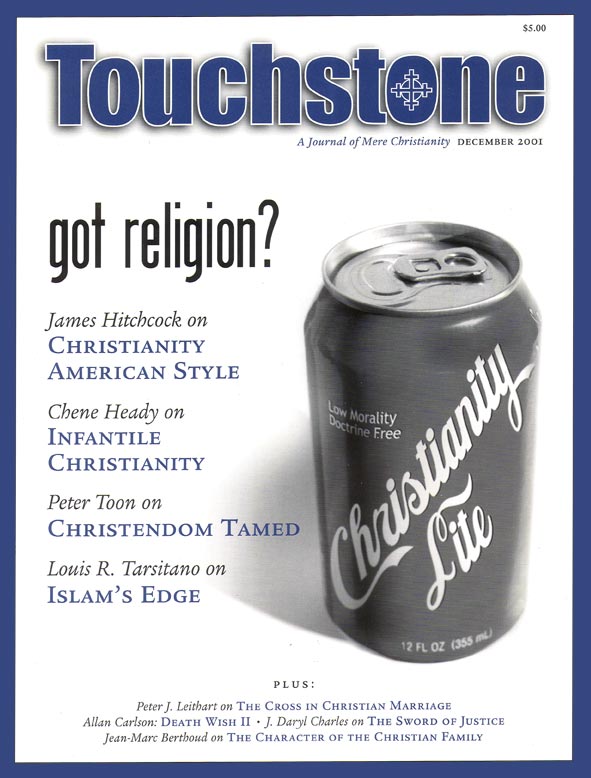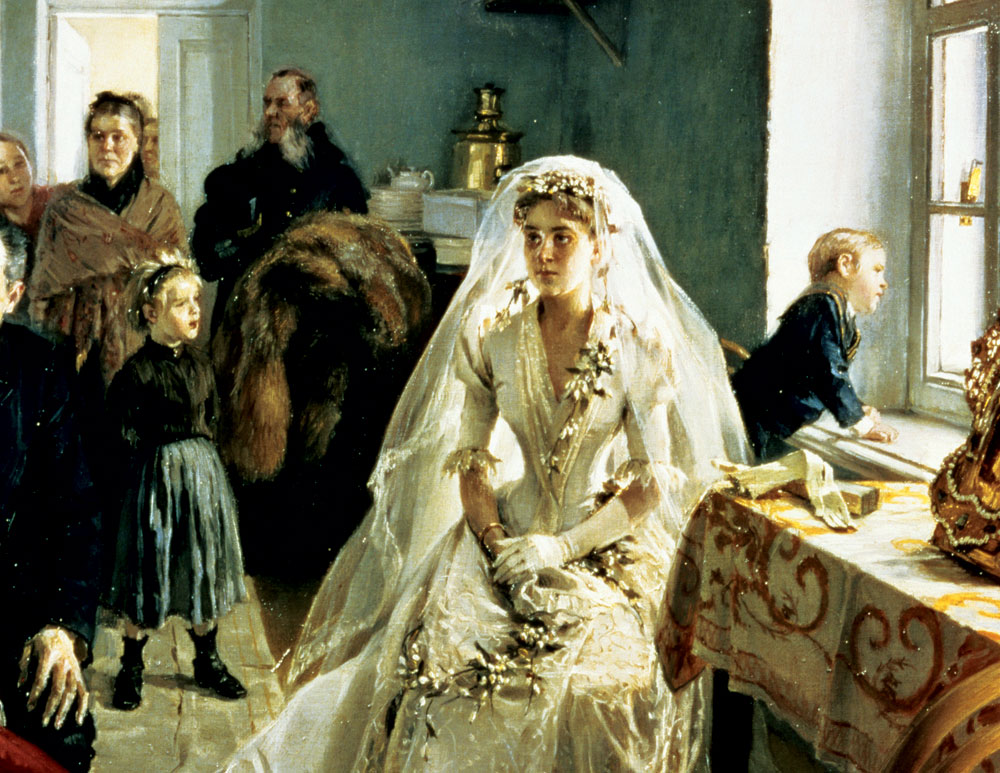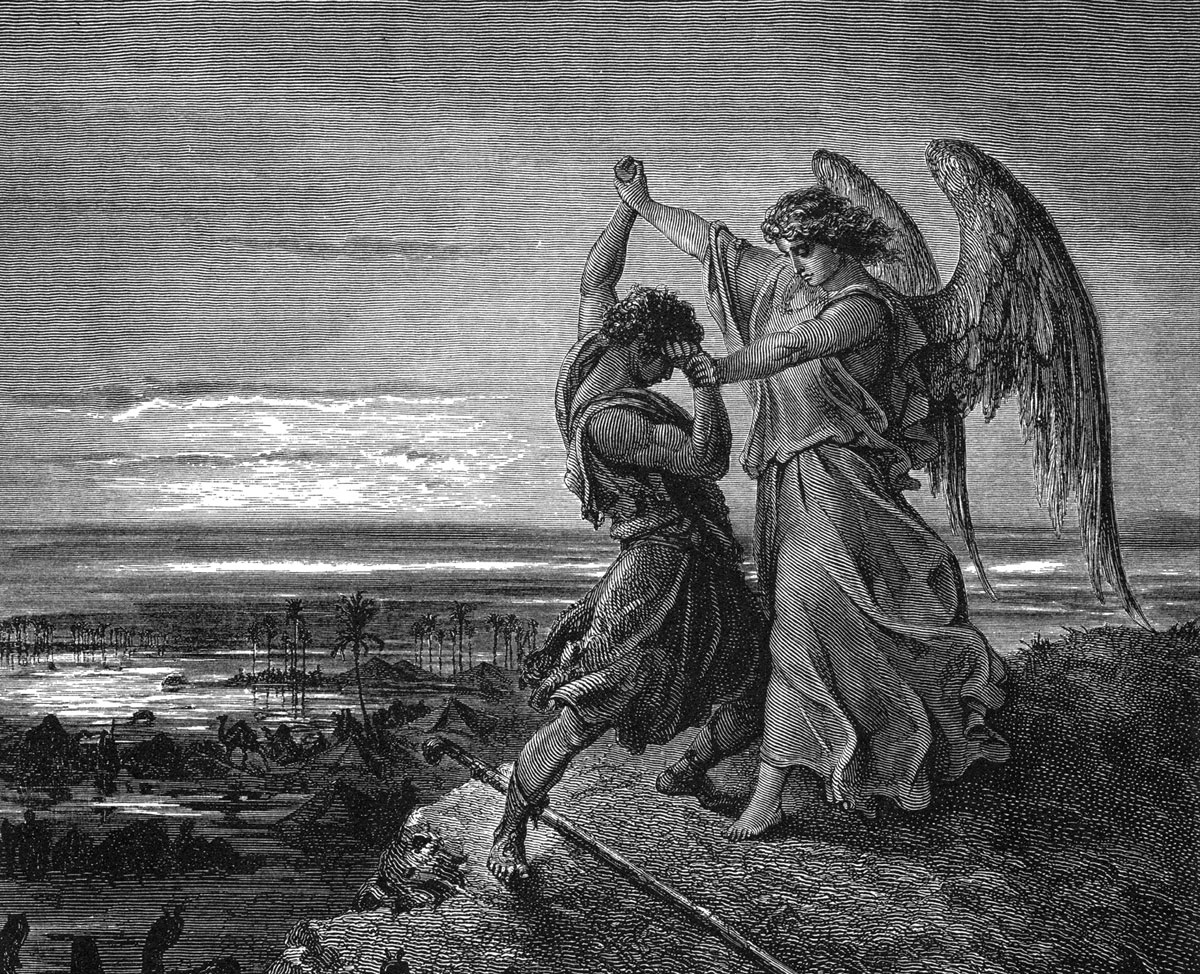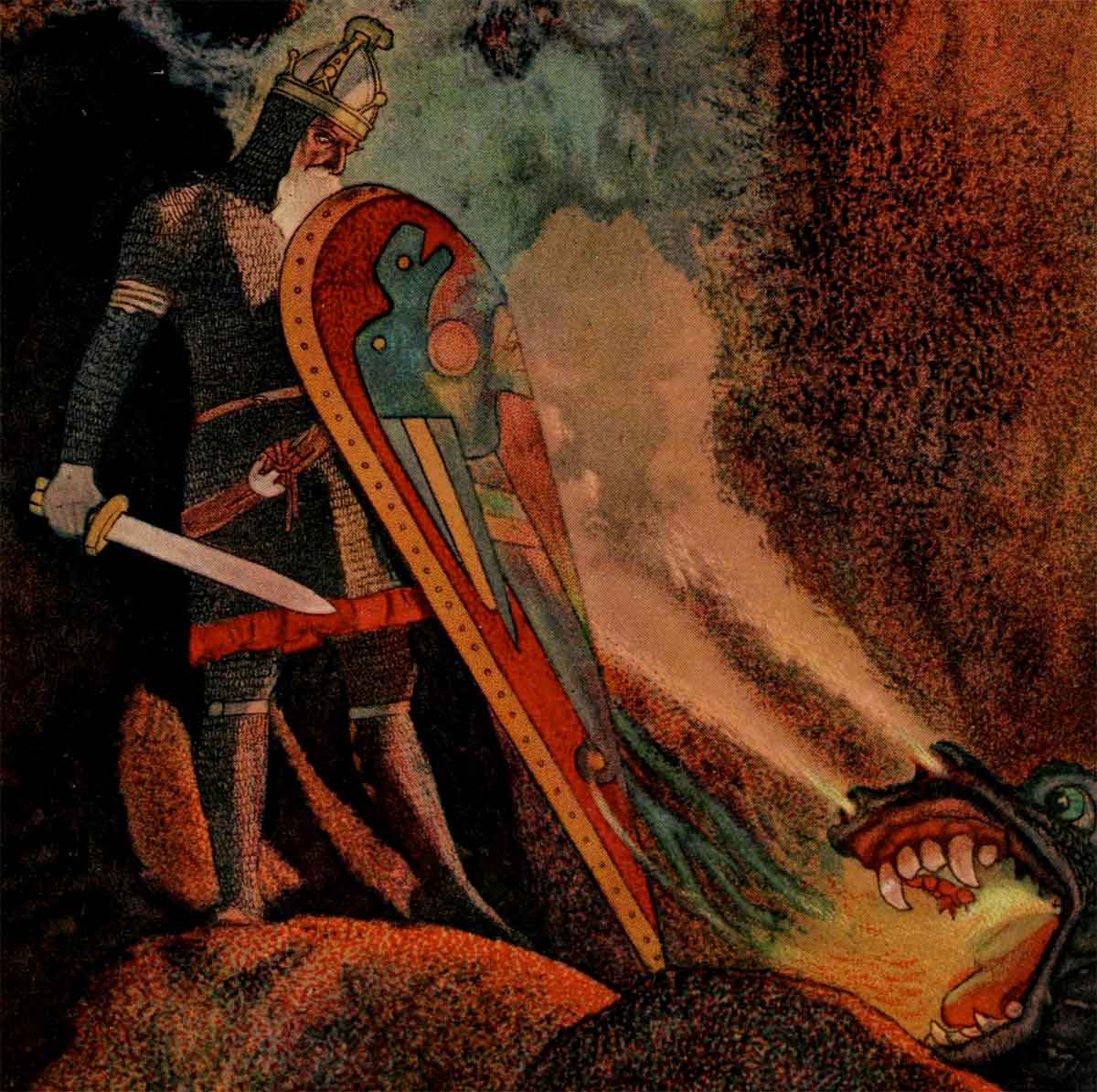The Model Family
The Role & Character of the Family in Christianity
by Jean-Marc Berthoud
Some preliminary remarks are in order before entering into the heart of our subject. They will deal with the last term in our subtitle: “The role and character of the family in Christianity.”
What do we mean by “Christianity”? We must clearly distinguish between what can be called “historic Christianity” and, for want of a better expression, what we shall call “modern Christianity.” Whatever we have to say regarding the role of the family in Christianity will be in relation to the historic Christian faith and not to its modern counterfeit. Today, the latter all too often masquerades as the genuine article. The distinction to which we draw your attention is not the vertical (or denominational) differentiation between various branches of the Church (Orthodoxy, Roman Catholicism, Protestantism, or Evangelicalism) but a horizontal demarcation that cuts through each of these segments of the Christian faith. Within each Christian denomination, you will find both partisans of the historic Christian faith and proponents of its “modern” critical travesty. I shall be speaking of the genuine Christian faith, not of its travesty, of its apostasy.
Having put these preliminary remarks out of the way, we shall now turn to our theme: the role of the family in Christianity. The role the historic Christian faith assigns to the family cannot adequately be grasped without an understanding of its origin and character, its obligations, and its final end or purpose. We shall briefly deal with each of these aspects.
The Origin of the Family
Scripture, both Old and New Testaments, tells us that the family,1 like man himself, the stars, the earth, and the sea, and all that they contain, is a creature, that is, a social form directly created by God, and that its members—each and every one of us—are finally accountable to him for the way we treat this institution. The family thus bears the character of a permanent substantial form (like biological species or chemical elements) and as a result, like all created forms, cannot in the long run be destroyed by man.
This allows us to draw the following conclusions: The created family is constitutive of the human race and, even if it is today under dire attack, cannot be abolished; all men and women, by their very nature, belong to the family; and all human beings, irrespective of their religious (or irreligious) beliefs, can no more escape this divinely established framework than they can stop breathing, or refuse to use their digestive system, or reject the circulation of their blood.
This inescapable stability of the family explains our meeting here in Geneva, for what has brought us together is our common conviction of the foundational nature of the family, which, as a created institution, includes us all within the scope of its authority. What can comfort us in the battle we are all waging in defense of the created family is its indestructible character, as indestructible as the order of the universe itself. This shows us the utter futility of the efforts of those who seek to destroy it. They are, by the very nature God has given them, with every new generation, forced to reestablish the family. It is fitting for us to begin our considerations on the role of the family in Christianity by hearing, first, the witness of the Torah, particularly in the Book of Genesis, and then that of the Messiah himself, as faithfully reported by the apostolic witness of Mark on the divine origin and creational character of the family.
And the Lord God said, It is not good that man should be alone; I will make him an help meet for him. . . . And Adam said: This is now bone of my bones, and flesh of my flesh; and she shall be called Woman, because she was taken out of man. Therefore shall a man leave his father and mother, and shall cleave to his wife; and they shall be one flesh. (Gen. 2:18,21–24)
So God created man in his own image, in the image of God created he him; male and female created he them. And God blessed them, and God said unto them: Be fruitful, and multiply, and replenish the earth, and subdue it; and have dominion over the fish of the sea, and over the fowl of the air, and over every living thing that moveth upon the earth. (Gen. 1:27–28)
So much for the Torah. Let us now look at the apostolic witness:
And the Pharisees came to him, and asked him: Is it lawful for a man to put away his wife? tempting him. And he answered and said unto them: What did Moses command you? And they said: Moses suffered to write a bill of divorcement, and to put her away. And Jesus answered and said unto them: For the hardness of your heart he wrote you this precept. But from the beginning of the creation God made them male and female. For this cause shall a man leave his father and mother, and cleave to his wife; and the two shall be one flesh; so then they are no more two, but one flesh. What therefore God has joined together, let no man put apart. (Mark 10:2–9)2
So both the Torah and the New Testament, both Moses and Jesus Christ, witness to the divine origin of the creational family, to its fundamental unity and to its strictly exclusive and monogamous character. For the created family is a true substantial form, “one flesh,” which “no man” (this includes the Population Council of New York and the homosexual lobbies the world over) dare “put apart,” that is to say, destroy. What the text of Genesis reveals is the dual aspect of the family: the communion and mutual support of husband and wife so wonderfully and delicately described in the Song of Songs, in the final chapter of the Book of Proverbs, and in the fifth chapter of Paul’s Epistle to the Ephesians; and the natural consummation of marriage in the procreation of numerous children, fecundity universally considered by the Bible as a divine blessing.3 Such teachings from the Old Testament are abundantly echoed in the New Testament.
The Character of the Family
The idea that the modern nuclear Western family consisting of two parents, seen as functionally interchangeable, and accompanied by one or, at most, two children, whose conception has been explicitly desired and carefully “planned,” constitutes the Christian model of the family is far removed from the truth. The Christian biblical family has a very different character. It is above all a complex and highly organized institution. In some respects it is monarchical, in others aristocratic, and from another angle it can even be considered to have a democratic character.
First, it is basically monarchical. If husband and wife are both created in the image of God, they are also both sinners and the objects of God’s mercy. In this respect there is no basic spiritual difference between man and woman.4 This in no way implies the exclusion of hierarchy from the structure of the family. The family institution is in fact strictly monarchical in structure, in the sense that the husband, far from being the mathematical “equal” of his wife, is very definitely her institutional superior. Both the Old and New Testaments are very clear on this count: The man is legally the head of the wife.
The explanation of this conjugal hierarchy is fundamentally religious: Both the Old and New Testaments teach us that the relationship between husband and wife constitutes an image of the relation between God and his creation, between the Lord God and his covenant people, and between Jesus Christ—the Second Person of the Trinity—and the people of the renewed covenant, the Christian Church. The latter is made up of men and women of all nations who, by faith in the Messiah, have become heirs to the promises given to Abraham.
The restoration of the biblical structure of the family must thus be accompanied by the total rejection of our pseudo-mathematical egalitarianism, particularly that posited by contemporary society between man and wife. We must resolutely return to the hierarchical structure of the biblical family. Of course, as the whole Bible makes abundantly clear, this structural and institutional hierarchy in no way condones any kind of tyrannical domination of the husband over his wife. But equally abhorrent to the biblical family is the feminist domination of the man so common to our Western societies. Worse still is a family (or a society) ruled by the whims of children.5 The question here is one concerning the way in which institutions—in this case, that of the family—are structured and does not concern that of the intrinsic inferiority or superiority of different human beings. The reading of the last chapter of the Book of Proverbs and a careful examination of the vital role played by women in the ministry of Jesus Christ and of the Apostle Paul should make this abundantly clear.
But the biblical family is also structured in a hierarchical, aristocratic manner. If the father is, as we have seen, the family’s king, then his wife is his queen. This is the reason why the Christian marriage ceremony was for so long (until the time of Breughel the Elder in the sixteenth century) celebrated as a coronation. This is still the case today in the Orthodox tradition. Together, husband and wife form the government of the family.
Thus the Christian family is not governed by the sole monolithic (monist) authority of the father and husband, but by a kind of bicameral system of government. The authority of the wife counterbalances that of her husband. But she always remains under his final authority. That is why the New Testament speaks of the first sin not as Eve’s but as Adam’s, for he as husband was, in the final resort, personally accountable to God for all that transpired under his authority. The theological reason for this dual form of government—a guarantee against arbitrary male absolutism—lies in the fact that if, on the one hand, man is personally created in the image of God, the family, on the other, is made after the image of the heavenly family, the Trinity, Father, Son and Holy Spirit, three Divine Persons, One God.6
Finally, in the Christian perspective, the family has, to a certain degree, a democratic character. Not that in the family, as happens constantly in the perverted form of democracy everywhere prevalent in the West today, the majority of votes establishes the truth. This is nothing else but the divinization of man and of number. All the members of the household (the enlarged family), children as well as the parents, servants, and employees7—being all created in the image of God—have their appropriate say (according to their age and condition) in the life and direction of the family. This is, of course, under the direction of the parents and the final authority of the father.
Here again we see the beneficent effects of the divine model of the family, the Trinity. For we see in the structure of the biblical family an emphasis both on its unity and its diversity. The children’s say in the affairs of the family will grow as they become older, until such time as they will, in turn, each “leave his father and mother, and . . . cleave to his wife [or husband]; and they shall be one flesh.” Thus they will themselves establish a new family on the basic model of that of their parents.
This detachment of the new branch of the family from the patriarchal trunk allows for innovation. Its attachment to the basic model ensures continuity. The result of the highly structured and diversified nature of the biblical model of the family is the constitution of an extraordinarily resilient and flexible institution capable of acting in common and endued with the strength to offer lasting resistance to the totalitarian pretensions of the wider institutions of society, whether they be of a political or a religious character.
Roles & Functions
Having examined the origins of the family and its basic character or structure, let us now turn to its fundamental role, or rather to the numerous roles it is called to play. We must first note the extremely limited present function of the family in Western society. This model of the family, because of the political, economic, and cultural domination of the West over the whole planet, exercises a dominant attraction for the families of the world.
Now this Western model, when compared to the family as revealed in the teachings of the Bible (and to the widespread practice even of non-Christian nations until a recent period), is a fundamentally truncated image of the true character of the family and of the potential achievements of this institution. The actual Western model of the family—a temporary, fragile, and unstructured grouping of atomized and equal individuals—has in fact very little to do with the family as revealed in the teachings of the Scriptures. This Western reductionist view of the family is a sociological and historical anomaly,8 a philosophical aberration,9 and is, from the point of view of the historic Christian faith, unquestionably heretical. As such, this model must be rejected if we are to begin solving the innumerable problems it has brought upon our civilization.
The Basic Unit of Society
As is clearly witnessed by the Torah, the family has a temporal priority over every other social institution. God created Adam first, then from Adam he made Eve, and together they brought forth children into the world. All social institutions—religious, political, economic, and cultural—have their root in this original family. This in itself justifies the purpose of this Congress and explains its motto: The natural family is the fundamental social unit.
But we must say more. With the diversification of society, the functions once exclusively held by the family in the religious, political, economic, and cultural fields have come to be delegated to larger institutions deemed better able to accomplish their function, such as the state, the Church, business organizations, schools, and so on. Many of these functions are nonetheless still substantially part of the vocation of the family. Delegating them to other organizations is one thing. Abandoning the political, economic, educational, and religious functions of the family to the state, the Church, business organizations, or schools constitutes the vocational betrayal of the family’s true functions. The Western family has in fact given up almost all of its divinely ordained functions to the Almighty State. It has thus become an empty shell, a temporary and insignificant assemblage of individuals, soon to be durably dispersed. These atomized individuals, for all their pretension to personal liberty and autonomy, are in fact totally dependent on the functioning of our new Leviathan, the modern bureaucratic state.
We will now examine what such a biblical vision of the family means.
A Miniature Political Order
The word government in the biblical perspective does not first apply to the government of the state. Men and women must first know how to govern themselves before they can think of governing others. Husband and wife can then together seek to govern their household. Then comes the government of wider organizations such as the Church, the business enterprise, and all kinds of voluntary associations. Only then can we speak of government as the government of the society at large.
It is useful to remember that in the beginning, that is, at the time of the creation of the world, the biblical family constituted the first political order. By its very nature it represents an independent political society. It has a presiding authority in the person of the father and a differentiated government in the form of the common direction of the family by the parents. Placed as they are under the supreme and overarching authority of God’s Law, those who govern the family establish the rules by which it functions. In this way the family exercises a legislative function. Further, within the bounds of the family, the parents constitute a judicial authority that can, of its own prerogative, judge cases where the family’s laws have been infringed. Finally, the family exercises clear “police” functions, having the biblical authority to punish acts contrary to the laws of its modest polity.
These are the privileges and duties that from a biblical perspective constitute each family as an independent political order. Of course, this political microcosm does not exist in a vacuum, independently of a wider political order, that of the state, which is itself placed under the overarching authority of God’s Law. The state must, wherever necessary, punish whatever crimes are perpetrated within the political microcosm of the family. But the intervention of such an external authority must be strictly limited to bona fide crimes and be always undertaken with prudence. For it is one of the functions of the state, as defined by the Bible, to see to the preservation of the independence of these miniature familial political orders.
What we can observe today in the West is the persistent action of the secular (i.e., atheistic) state aimed at usurping these political functions of the family and reducing them to nothing. In my country, Switzerland, for example, the paternal authority has been legally abolished in the name of a functional equality (even interchangeability) between husband and wife. Indeed, the very names of husband and wife no longer appear in our federal matrimonial law. They have been replaced by that of partner. In some European countries, biblically sanctioned corporal punishment applied by parents on their own children can lead to their imprisonment.
We are in the process of going one step further in the devaluation of the biblical family by the proposition put forward by our authorities to institute a legal status for so-called homosexual couples. This total moral and natural aberration was passed into law in France, which followed the example of the Netherlands, Denmark, Sweden, Norway, and Iceland. It is very clear today that our “post-Christian” nations have lost all sense of the nature and purpose of the family. Non-Christian nations are not in such a state of intellectual, moral, and social corruption. Among other things, they still preserve a sense of the creational meaning of the family.
A Miniature Economic Order
The biblical vision of the family also implies a high degree of autonomy on the economic level. The family is essentially conceived as an independent economic organism. Thus, from a Christian point of view, the basic economic unit of society is familial. In this sense, all the members of the family have a decisive, if differentiated, role to play in the economic welfare of the whole. The father bears the brunt of the task of providing for the material welfare of the family. Here he is helped by the highly varied activities of his wife—her work being principally related to homebuilding—but the children also, as they grow up, become ever more effective aids. Servants, and in certain societies, slaves, are, from the biblical point of view, to be considered as forming a part of the household and must in consequence be treated as such.
In marriage, the children leave their parents to constitute their own new independent families. But the lateral bonds between families remain strong. These outgrowths of the original family constitute new political and economic organisms, functionally independent of the parents but not forgetful of their responsibilities towards them.
This relative economic autarky of the family farm in Europe, for example, was until a recent period, a very common phenomenon. This was also true of the small artisan shop.10 As a family, we have experienced the effectiveness and power of such an independent family organism, particularly in the battle we have waged over the past 25 years for the defense of the traditional family in French-speaking Switzerland. Without the constant help of my wife and children, all cheerfully working together in the framework of our Christian Parents’ Association, much less would have been accomplished.11
Moreover, such a highly functional view of the family implies a very positive attitude towards the birth of children. In the biblical perspective, the birth of a child is seen as a great blessing, and the growth of the family perceived as growth in effective power. A well-organized, hierarchical, and disciplined family is indeed a very powerful organization. That is why the modern atheistic state is so determined to destroy it. Such a family not only is a highly productive institution but also constitutes a basic and extremely efficient unit for the exercise of social welfare.
In such a family the elderly parents are not cruelly excluded from a productive function in society by retirement at an arbitrary age but, as their strength weakens, gradually diminish their activities. The welfare of the parents in old age is assured, not by fragile and impersonal state pension schemes, which are being destroyed by our declining birthrate, but by personal support provided by the existence of numerous children who understand what it means to honor father and mother.
Within such a strong and flexible structure it is also easy to integrate into the household the unmarried members of the family. Thus all—old and young, married and unmarried—can play an important role in the multifarious facets of the life of the family. Such a family constitutes an organism whose resilience makes it able to support its members in situations of crisis, such as sickness, bereavement, or loss of work. Such a flexible and strong social institution is a powerful bulwark against the totalitarian pretensions of the modern bureaucratic state.
A Cultural & Educational Organism
In the West it is considered normal for the family not be directly involved in the schooling of its children. This task is usually delegated to the state educational system. The biblical teaching on this matter is very clear. This task is the duty of the parents, who are accountable to God for the religious, moral, intellectual, and practical education given to their children.12 If the parents delegate this authority to organizations external to the family, such as private schools that teach their children within a framework of belief they can approve, they nonetheless remain personally accountable for the education their children receive. The Christian Home School Movement, which has grown so vigorously since its inception in the United States some 20 years ago and is today burgeoning in many countries, has done much to restore this vital educational function to the family.13 The academic and educational results produced by this restoration of formal instruction to the family have been remarkable.
But, in addition, the restoration of this function to the parents has had an exceptional effect on the very life, structure, and cohesion of the families involved. The return of the parents to this aspect of an active obedience to the conditions of the biblical covenant has brought with it very great blessings. Not only are the children brought up in the Christian beliefs of their parents, but the parents themselves rediscover the great and unsuspected riches of the institution with which God has entrusted them.
This path leads to the restoration of the family as the foundational institution of society and to the dethroning of the religious—in this case cultural and educational—pretensions of the state in its bloated unnatural domination of the living institutions of society. The return to such a path of obedience to God will no doubt lead to the building up of healthy social structures in our nations.
A Religious Institution
It is clearly impossible to speak of the role of the family in Christianity without mentioning its religious role. As we have already pointed out, the family is indestructible, for as a created institution, it bears the image of the Heavenly Family, the Holy Trinity, One God in Three Divine Persons, Father, Son, and Holy Spirit. In addition, we have seen that the loving authoritative and submissive relationship between husband and wife constitutes a living image of the relationship that unites Jesus Christ to his Church, the Church being the harbinger of the new creation. In the historic Christian perspective, whether Eastern Orthodox, Roman Catholic, Evangelical, or Reformed, the family is a covenantal institution. The family is thus seen as an institution placed under the special protection of God.
Since the end of the seventeenth century, this covenantal character of the family has in the West been replaced by the secular notion that the family is simply a contractual institution and, as such, dissolvable at will. This means that the vision of the family as a stable created form (like species in biology or the elements of chemistry) has been abandoned in favor of the notion that individuals (like the isolated atoms of Newtonian physics governed only by mathematical laws) can make (or unmake) the family at will. Thus, the West has abandoned all sense of the sacred character of the family.14
This secularization of the family is the fruit of the atheization of Western thought. Today, with the legal recognition of so-called homosexual marriages, we have gone a step further. We no longer even recognize the normalcy of the natural character of the family.
As a religious institution, the family has a temporal and practical priority over the Church. In the beginning, in the persons of our first parents, Adam and Eve, the family represented the Church. It is interesting to note that the first sacrifices, those of Cain and Abel, were offered in the context of the family. This is seen also with Noah at the time of the Flood, as well as in the sacrifices offered by Abraham, Isaac, and Jacob.
This state of affairs changed to some degree with the instauration of the ceremonies of the Mosaic Law, and much later in the ecclesiastic form of worship practiced in the Apostolic Church. We can observe in the Apostolic Church how the biblical household often serves as the nucleus for the establishment of local churches. But even today in the Christian family the father retains a spiritual authority that makes of him not only the political, judicial, and economic leader of his social microcosm, but its religious head as well.
We have seen that the Christian view of government is first personal; then it is the government of the family by the parents; and finally it is the political government of the nation. Likewise, the relation of the Christian to God is first intimately personal; then it is exercised in the wider context of family worship; and finally it is formally ecclesiastical. We have gradually discovered to what extent from the Christian perspective the natural family is the fundamental social unit. We find now that this is equally true in the religious sphere. For if the family is disordered spiritually, then the wider religious community will manifest very similar disorders. Such religious disorders will very soon cause serious damage to the society at large.
A Humble Return
What I have presented here is clearly not a sociological description of the present state of the family in what is left of a formerly vital, creative, and beneficent Christendom. The picture I have endeavored to draw before you is that of a model to be imitated, a social purpose that all who wish to see the restoration of the family must seek to put into practice. This purpose is nothing less than the realization of that original model of the family established for all men at the creation.
This model is deformed by our sin, our willful disobedience of God’s Holy Law as it is revealed in the Torah, indeed in all the commandments contained in the Old and New Testaments. It is what still persists of this model in our nations that the powers behind the atheistic (and pantheistic) utopian globalism seek to remove from the face of the earth.
But the present worldwide assault on the family—a cultural, political, economic, and spiritual war to which this congress provides ample witness—must first be seen as a sure sign of God’s holy displeasure with the present condition of mankind. Because of the tremendous growth of evil in the world, God, in faithfulness to his judgment on stubborn perseverance in sin consigned in his covenant, is today clearly (particularly in our apostate West) withdrawing his protective hand from the families and nations of the earth. We must confess that this divine judgment on the families of the world strikes first, and most severely, at our Christian nations—the nations of an impious, immoral, and apostate Christendom.
As always, God’s judgment can be turned aside, but only by the true and sincere repentance of men from their evil ways and by their return to the worship and obedience due to the only true God. The path of our deliverance is revealed in the divinely inspired Scriptures, and publicly manifested in the Person of his Son, the Messiah of Israel, our Lord Jesus Christ.
The covenant established in the beginning with our first parents, Adam and Eve, was broken by their willful disobedience. But God, in his mercy and longsuffering patience, through the history of the patriarchs before the Flood and with the descendants of Abraham, worked towards the re-establishment of his covenant with men. And to this work of redemption, redemption that includes the deliverance of the family from its enemies, the Christian family must bear a clear witness. For this covenant established with Adam and renewed in Noah and Abraham, Moses and David, was finally, fully and definitively established through the Incarnation, death, and Resurrection of our Lord Jesus Christ.
It is only through the humble return of all men to the witness of this immemorial covenant that we can hope to see the total defeat of those evil powers that, in their constant ambition to usurp the throne of God, manifest their hatred of the divine family through their efforts to destroy that image, the human family. In such dangerous times we draw our comfort and our hope from the words of the prophet Isaiah:
According to their deeds, accordingly he will repay, fury to his adversaries, recompense to his enemies; to the islands he will repay recompense. So shall they fear the name of the Lord from the West, and his glory from the rising sun. When the enemy shall come in like a flood, the Spirit of the Lord shall lift up a standard against him. And the redeemer shall come to Zion, and unto them that turn from transgression in Jacob, saith the Lord. As for me, this is my covenant with them, saith the Lord: My spirit that is upon thee, and my words which I have put in thy mouth, shall not depart out of thy mouth, nor out of the mouth of thy seed, nor out of the mouth of thy seed’s seed, saith the Lord, from henceforth and forever. (Is. 59:18–21)
Notes:
1. On the biblical basis of the family, I recommend two brilliant, detailed expositions of the concrete application of the Ten Commandments: Pierre Viret, L’Instruction Chrétienne en la Loi et l’Evangile, shortly to be republished for the first time since 1564 in ten volumes by L’Age d’Homme in Lausanne; and Rousas John Rushdoony, The Institutes of Biblical Law, Vol. 1, Presbyterian and Reformed Pub. Co., Philadelphia, 1973; Vol. 2, Law and Society, 1982, and Vol. 3, The Intent of the Law, 1999, both from Ross House Books, Vallecito, California.
2. See also the following texts: Matt. 19:3–9; 1 Cor. 6:16; Eph. 6:31.
3. See in particular Psalms 127 and 128.
4. This spiritual “equality” applies also to other social categories. It does not abolish creational and social distinctions and hierarchies such as those that exist between slaves and freemen, Greeks and Jews, Chinese and Africans, soldiers and officers, children and parents, etc. See Gal. 3:28 and Col. 3:11.
5. See on this vital subject the teaching of the Prophet Isaiah, Is. 3.
6. See, among other texts, Eph. 3:14–15.
7. In biblical society, and at other times in the history of Christianity, the enlarged family or household would include the slaves.
8. J. D. Unwin, Sex and Culture (Oxford: Oxford University Press, 1934); Hopousia, or the Sexual and Economic Foundations of a New Society (London: George Allen and Unwin, 1940).
9. A philosophical aberration in its nominalist rejection of universals, here the universal of the family. See the study by Georgette Papacostoula, Les conceptions d’Aristole sur la famille et l’education morale (Athens, 1956).
10. On the nature of the European family in the nineteenth century, see the works of Frederic Le Play.
11. A detailed account of the way such a family functioned in Europe in a period as recent as that just before and after World War II is to be found in the epic novel, The Red Horse, by the Italian Roman Catholic novelist Eugenio Corti. This book, already in its fourteenth printing in Italy (in spite of the total blackout by the secular media!), is also available in English from Ignatius Press.
12. See for example Deut. 6:4–9. The Book of Proverbs is full of indications on the essential responsibility of the family for the formal education of its own children.
13. See Samuel Blumenfeld, Homeschooling: A Parent’s Guide to Teaching Children (Secaucus, New Jersey: Citadel Press, 1997).
14. See Alfred Dufour, Droits de l’Homme, droit naturel et histoire (Paris: Presses Universitaires de France, 1991); Mariage et société moderne (Fribourg, Switzerland: Editions Universitaires, 1997).
Jean-Marc Berthoud was born in South Africa from French-Swiss missionary parents in 1939. He was educated at the University of the Witwatersrand (Johannesburg), the Sorbonne in Paris, and the University of London. He is the father of five children and grandfather of two girls. He is the President of the Association vaudoise de parents chrétiens and editor of the review Resister et Construire, author of a number of books and numerous articles on education, history, philosophy, theology, politics, international affairs, and related subjects. He earns his living by working at the Post Office.
A version of this paper was read for the Second World Congress of Families held in Geneva, Switzerland, November 14–17, 1999. A fuller exposition of the views developed in this paper can be found in Jean-Marc Berthoud, L’école et la famille contre l’utopie (Lausanne: L’Age d’Homme, 1997) and more particularly in the first part, dealing specifically with the family.
subscription options
Order
Print/Online Subscription

Get six issues (one year) of Touchstone PLUS full online access including pdf downloads for only $39.95. That's only $3.34 per month!
Order
Online Only
Subscription

Get a one-year full-access subscription to the Touchstone online archives for only $19.95. That's only $1.66 per month!
bulk subscriptions
Order Touchstone subscriptions in bulk and save $10 per sub! Each subscription includes 6 issues of Touchstone plus full online access to touchstonemag.com—including archives, videos, and pdf downloads of recent issues for only $29.95 each! Great for churches or study groups.
Transactions will be processed on a secure server.
more on family from the online archives
more from the online archives
calling all readers
Please Donate
"There are magazines worth reading but few worth saving . . . Touchstone is just such a magazine."
—Alice von Hildebrand
"Here we do not concede one square millimeter of territory to falsehood, folly, contemporary sentimentality, or fashion. We speak the truth, and let God be our judge. . . . Touchstone is the one committedly Christian conservative journal."
—Anthony Esolen, Touchstone senior editor













